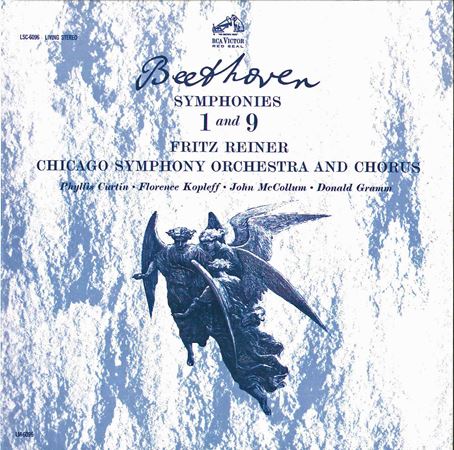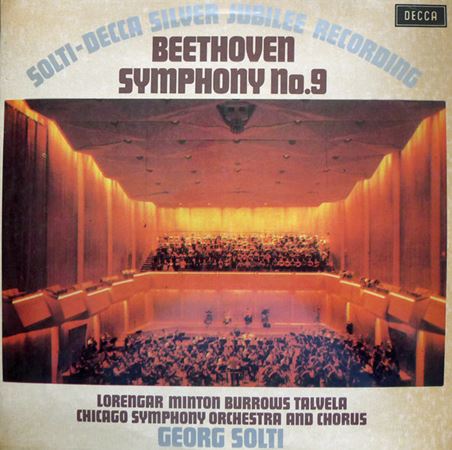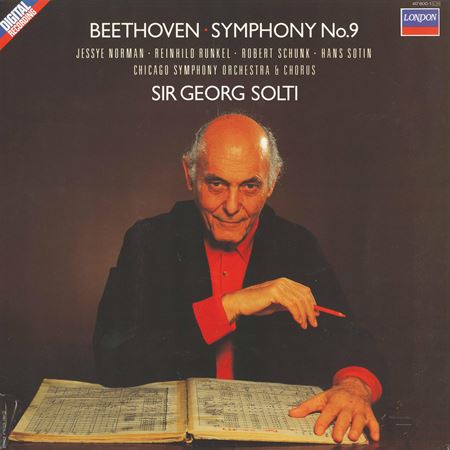First page detail of a choral score, edited by Arthur Mees, the Orchestra’s first assistant conductor
Frederick Stock Collection, Rosenthal Archives of the Chicago Symphony Orchestra Association
Beethoven’s Ninth Symphony — according to Frederick Stock, the Chicago Symphony Orchestra‘s second music director, in Talks About Beethoven’s Symphonies — is “dedicated to all Mankind. Embracing all phases of human emotion, monumental in scope and outline, colossal in its intellectual grasp and emotional eloquence, the Ninth stands today as the greatest of all symphonies.”
Stock continues: “The Ninth is unquestionably the greatest of all symphonies not only because it is the final résumé of all of Beethoven’s achievements, colossal as they are even without the Ninth, but also because it voices the message of one who had risen beyond himself, beyond the world and the time in which he lived. The Ninth is Beethoven, the psychic and spiritual significance of his life.
“In the first movement we find the bitter struggle he waged against life’s adversities, his failing health, his deafness, his loneliness. The Scherzo depicts the quest for worldly joy; the third movement, melancholy reflection, longing — resignation. The last movement, the ‘Ode to Joy,’ is dedicated to all Mankind.”
“There’s something astonishing about a deaf composer choosing to open a symphony with music that reveals, like no other music before it, the very essence of sound emerging from silence,” writes CSOA scholar-in-residence and program annotator Phillip Huscher. “The famous pianissimo opening — sixteen measures with no secure sense of key or rhythm — does not so much depict the journey from darkness to light, or from chaos to order, as the birth of sound itself or the creation of a musical idea. It is as if the challenges of Beethoven’s daily existence — the struggle to compose music, his difficulty in communicating, the frustration of remembering what it was like to hear — have been made real in a single page of music.”
Founder and first music director Theodore Thomas first led the Chicago Orchestra in Beethoven’s Ninth Symphony on December 16 and 17, 1892, at the Auditorium Theatre. The soloists were Minnie Fish, Minna Brentano, Charles A. Knorr and George E. Holmes, along with the Apollo Chorus (prepared by William L. Tomlins).



Sixth music director Fritz Reiner led the Orchestra’s first recording of Beethoven’s Ninth Symphony on May 1 and 2, 1961, in Orchestra Hall. Phyllis Curtin, Florence Kopleff, John McCollum and Donald Gramm were the soloists, and the Chicago Symphony Chorus was prepared by Margaret Hillis. For RCA, Richard Mohr was the producer and Lewis Layton was the recording engineer.
Sir Georg Solti and the Chicago Symphony Orchestra and Chorus first recorded Beethoven’s nine symphonies between May 1972 and September 1974 for London Records. The recordings were ultimately released as a set (along with three overtures: Egmont, Coriolan and Leonore no. 3); that set won the 1975 Grammy Award for Classical Album of the Year from the National Academy of Recording Arts and Sciences. The Ninth Symphony was recorded at the Krannert Center at the University of Illinois in Urbana on May 15 and 16, and June 26, 1972. Pilar Lorengar, Yvonne Minton, Stuart Burrows and Martti Talvela were the soloists, and the Chicago Symphony Chorus was prepared by Margaret Hillis. David Harvey was the recording producer, and Gordon Parry, Kenneth Wilkinson and Peter van Biene were the balance engineers.
Between September 1986 and January 1990, Solti and the Orchestra and Chorus recorded the complete Beethoven symphonies a second time, again for London Records; and again, the recordings were ultimately released as a set (along with two overtures: Egmont and Leonore no. 3). The Ninth Symphony was recorded in Medinah Temple on September 29 and 30, 1986. Michael Haas was the recording producer, John Pellowe the balance engineer, and Neil Hutchinson the tape editor. Jessye Norman, Reinhild Runkel, Robert Schunk and Hans Sotin were soloists, and Margaret Hillis prepared the Chorus. The release won the 1987 Grammy Award for Best Orchestral Performance from the National Academy of Recording Arts and Sciences.
This article previously appeared here.



